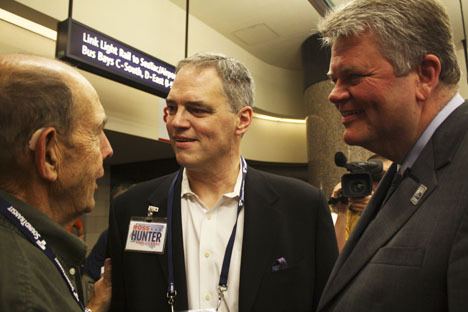State Rep. Ross Hunter knows he has the managerial skills and business background to improve the efficiency and accountability of today’s financial-strapped King County government.
“To run a $5 billion operation, you need somebody with management experience,” said Hunter, a former Microsoft executive and a four-term legislator from the 48th District on the Eastside. “You need to have someone who knows how the region is wired and someone who has run ‘something.’ “
Hunter, a general manager at MS for 17 years and the finance committee chairman in the Washington State House of Representatives, says he’s the choice to become the next King County Executive. But to reach the Nov. 3 general election, he must prevail in a tight-fisted Aug. 18 primary against seven other challengers.
“It is going to be close race,” Hunter admitted. “I don’t know how it’s going to turn out.”
According to a recent KING-TV-sponsored SurveyUSA poll, Susan Hutchison holds a solid lead with 41 percent of the projected vote. But the other front-runner has yet to emerge. King County Council Chairman Dow Constantine and King County Councilmember Larry Phillips have attracted 12 and 7 percent of the vote, respectively. State Sen. Fred Jarrett and Hunter follow with 7 and 6 percent of the vote.
The top two vote-getters in the primary will move on to the general election.
Hunter says there is a large number of undecided voters, between 20-40 percent, depending on various polls.
To spread his message and to gain the all-important South King County vote, Hunter’s busy campaign trail blazed through Auburn last week. He walked door to door, greeting people and lending an ear to their concerns.
“What better way to know what’s going on in Auburn?” Hunter said.
Hunter wants the county to get back to basics and fulfill regional needs by providing important services to the many, instead of the few.
Hunter recently outlined his plan for overhauling county government with a 16-page report, “King County 2.0 – Hard Choices and A New Regionalism.” Hunter calls for a renewed commitment to working together with other regional governments to solve problems and use taxpayer dollars more wisely.
“Fixing the budget in the long run is not about hiring freezes, short-term furloughs, or other temporary measures, though these are important in the short-run,” Hunter said. “Fixing the budget in the long run requires serious attention to underlying causes and having discipline about what we do as a region, not just as a stand-alone county government.”
Hunter’s plan focuses on the core functions of county government: regional criminal justice, public health, transit and protecting the environment
It proposes immediate steps to get the county on a more solid financial footing including:
• Re-structure of executive staff. This includes identifying executive staff that are buried in operating departments. The goal is to reduce the total staff size.
• Recover the jail process. Re-open negotiations with the suburban cities to see if there is a way the county can create a regional jail system, instead of a collection of independently operated jails that will increase over all costs for everyone.
• Start negotiations with labor for the 2011 contracts, possibly re-opening existing contracts if it makes sense. These contracts need to line up with other regional governments and the private sector, including having employees pay part of the premium cost of their healthcare choices.
• Re-structure departments to more carefully reflect the local/regional services split and to be more reasonable to administer.
• Ensure that the new accounting system is on-track and making rational decisions.
Hunter’s plan also includes new, stronger fiscal accountability and also outlines some hard choices that need to be made.
“King County employees should share in the basic premium costs of their health care, as almost all other employees in this region do,” Hunter said.
He also proposed reducing council staff.
“During the latest budget there were no reductions in executive or council staff, but we lost dozens of prosecutors, and significant public defender funding,” Hunter explained. “This does not reflect my priorities.”


